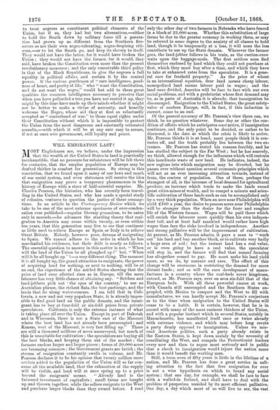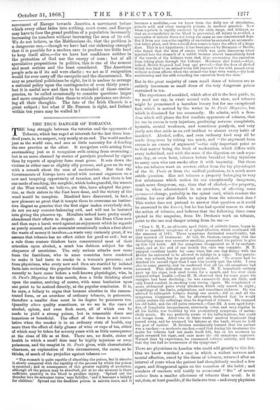WILL EMIGRATION LAST?
AIOST Englishmen are, we believe, under the impression J. that the wealth of the United States in land is practically inexhaustible, that no pressure for subsistence will be felt there for centuries, that the surplus population of Europe may be drafted thither in comfort for generations. So strong is this conviction, that we found upon it many of our laws and much of our social system, and even statesmen will receive the idea that emigration may prove a temporary phenomenon in the history of Europe with a stare of half-scornful surprise. Mr. Charles Pearson, the historian, who has recently been travel- ling in the United States, and who has made a special study of colonies, ventures to question the justice of these assump- tions. In an article in the Contemporary Review which we take to be one of the most extreme specimens of over-conden- sation ever published—regular literary pemmican, to be eaten only in morsels,—he advances the startling theory that emi- gration to America may cease within twenty, or even within ten years, that this generation may live to see that continent as little used to relieve Europe as Spain or Italy is to relieve Great Britain. Nobody, however poor, dreams of emigrating to Spain. We cannot adhere to the order in which he has marshalled his evidences, but their drift is nearly as follows. The essential question to answer in this matter is not, "When will the land of the Union be all ploughed up ?" but, "When will it be all bought up " I—a very different thing. The moment it is all bought up, the grand attraction to emigrants, the power of acquiring land for nothing, or next to nothing, will be at an end, the experience of the settled States showing that the price of land once allotted rises as in Europe, till the mere labourer has very little chance of obtaining any. "Settlers and land-jobbers pick out the eyes of the country,' to use an Australian phrase, the richest flats, the best pasturage, and the lands that lie along water-courses. I am told that in Cali- fornia, a new and not very populous State, it is already impos- sible to find good land on the public domain, and the immi- grant has to buy at four-fold or six-fold prices from private speculators. California is only the extreme instance of what is taking place all over the Union. Except in part of Dakotah and in Wisconsin, there is not a State east of the Missouri where the best land has not already been preoccupied ; and Kansas, west of the Missouri, is very fast filling up." There are still a thousand millions of acres unsurveyed, but much of this is unsuitable for cultivation ; the speculators are buying all the best blocks, and keeping them out of the market ; the farmers enclose larger and larger pieces ; farms of 20,000 acres are becoming common ; the Government grants are lavish ; the stream of emigration constantly swells in volume, and Mr. Pearson declares it to be his opinion that twenty million more settlers added to the population of the Union will so far con- sume all the available land, that the exhaustion of the supply will be visible, and land will at once spring up to a price beyond the emigrants' means. "Already land is the favoured investment of capitalists ; small farms are bought up and thrown together, while the sellers emigrate to the West and purchase larger blocks than they owned before. I read
only the other day of two farmers in Nebraska who have fenced in a block of 23,000 acres. Whether this substitution of large farms be due to the greater economy in working them, or may be referred in some degree to the anxiety of all classes to hold land, though it be temporarily at a loss, it will none the less contribute to use up the State domain. Wherever the farmer goes, the land-jobber follows in his train, as the carrion-crow waits upon the baggage-mule. The first settlers soon find themselves enclosed by land which they could not purchase at first, which they must buy after a time, and which they have to take at enhanced rates from the speculator. It is a gene- ral race for freehold property." As the price of wheat is an international equation, dear land means cheap labour, monopolized land means labour paid in wages ; and the land once divided, America will be face to face with our own social problems, and with a proletariat whose first demand may be, as in parts of Australia it is already, that immigration be discouraged. Emigration to the United States, the great safety- valve of modern Europe, will, in fact, if this induction is correct, come to an end.
Of the general accuracy of Mr. Pearson's view there can, we think, be no question whatever. Some day or other the con- dition of affairs which he anticipates must arrive, if immigration continues, and the only point to be decided, or rather to be discussed, is the date at which the crisis is likely to arrive. Mr. Pearson thinks it is at hand, most people think it is cen- turies off, and the truth probably lies between the two ex- tremes. Mr. Pearson has stated his reasons forcibly, and he has studied the subject in the Far West ; but he has scarcely, we think, allowed enough for the influences which will restrain this inordinate waste of new land. He indicates, indeed, the new regions into which emigration may be diverted, but he passes over without mention several economic principles which will act as an ever increasing attraction towards, instead of from, the centres of population. One of these, perhaps the strongest of all, is the increase of local demand for agricultural produce, an increase which tends to make the lands round great cities mines of wealth, and to compel a minute and scien- tific cultivation of those lands such as can be accomplished only by a very thick population. When an acre near Philadelphia will yield £100 a year, the desire to possess acres near Philadelphia will be stronger than the desire for the freer and rougher life of the Western farmer. Wages will be paid there which will enrich the labourer more quickly than his own indepen- dent toil, and at least half mankind would rather have high wages than face the risks involved in independence. Another and strong palliative will be the improvement of cultivation. At present, as Mr. Pearson admits, it pays a man to "work out" his land and buy another block, or to cultivate very badly a large area of soil ; but the instant land has a real value, or is even going to have a real value, the speculator will step in, and the farmer will find that nomad farming has altogether ceased to pay. He must make his land yield more, as we do, by manure and care. The effect of this change will be enormous in restricting the demand for more distant lands ; and so will the sure development of manu- factures in a country where the coal-beds cover kingdoms, extend, as Mr. Pearson says, over an area six-fold that of the European beds. With all these powerful causes at work, with Canada still unoccupied and the Southern States an- peopled, with Mexico to conquer and the West to fill with manufactures, we can hardly accept Mr. Pearson's conjecture as to the time when emigration to the United States will cease to be a habit. It is certain, however, that he is in accord with many of the most eminent thinkers of the Union, and with a popular instinct which in several States, notably in Massachusetts, has manifested itself once or twice already with extreme violence, and which may before long create a party firmly opposed to immigration. Unless we mis- read American politics, such a party already exists in the Eastern States, is kept down mainly by the necessity of conciliating the West, and compels the Protectionist leaders every now and then to argue most seriously and in public that a check to immigration would injure the nation more than it would benefit the working man.
Still, a term even of fifty years is little in the lifetime of a nation, and Mr. Pearson has done a great service in call- ing attention to the fact that free emigration for ever is not a wise hypothesis on which to found any social system ; that one day, for example, we shall be face to face with a walled-in Ireland, and shall have to deal with the problem of pauperism unaided by its most efficient palliative. One day, a day which most of us will live to see, the vast
movement of Europe towards America, a movement before which every other fades into nothing, must cease, and Europe may have to face the grand problem of a population incessantly increasing its numbers without increasing the area of its soil. We do not believe, as the Malthusians do, that the problem is a dangerous one,—though we have had one sickening example that it is possible for a modern race to produce too little food to keep itself alive,—for we have lost confidence neither in the protection of God nor the energy of man ; but of all speculative propositions in politics, this is one of the nearest and most serious and the least considered. The American people acts as if its soil were elastic ; we act as if emigration would for ever carry off the energetic and the discontented. We may as practical politicians be right, for it is useless to arrange a national policy upon the contingencies of even thirty years ; but it is useful now and then to be reminded of those contin- gencies, to be called occasionally to consider questions larger and more complicated than those to which partizans are devot- ing all their thoughts. The fate of the Irish Church is a great subject ; but what if Mr. Pearson is right, and Ireland within ten years may be walled in































 Previous page
Previous page